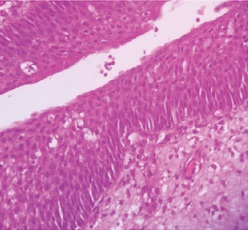Difference between revisions of "Nasal cavity and paranasal sinuses"
Jump to navigation
Jump to search

(Replaced) Tags: Mobile web edit, Mobile edit |
m (→Nasal or sinonasal polyps: Bolded) |
||
| Line 14: | Line 14: | ||
File:Histopathology of nasal squamous papilloma.jpg|'''Squamous papilloma''', with acanthosis and hyperkerratosis. | File:Histopathology of nasal squamous papilloma.jpg|'''Squamous papilloma''', with acanthosis and hyperkerratosis. | ||
</gallery> | </gallery> | ||
| + | In case of '''inflammation''', confirm that it is mixed and that lymphocytes are not atypical (otherwise, consult hematopathology, particularly whether it could be T cell lymphoma, nasal type. | ||
{{Bottom}} | {{Bottom}} | ||
Revision as of 19:23, 26 October 2022
Author:
Mikael Häggström [note 1]
Nasal or sinonasal polyps
Look for signs of malignancy. Further information: Evaluation of suspected malignancies

Benign nasal/sinonasal polyp (not otherwise specified), consisting of hyperplastic edematous connective tissue with some seromucous glands and inflammation (mostly neutrophils and eosinophils), surrounded by respiratory or squamous epithelium.[1] It can be termed inflammatory nasal/sinonasal polyp when inflammation is more pronounced.
Main differential diagnoses:
In case of inflammation, confirm that it is mixed and that lymphocytes are not atypical (otherwise, consult hematopathology, particularly whether it could be T cell lymphoma, nasal type.
Notes
- ↑ For a full list of contributors, see article history. Creators of images are attributed at the image description pages, seen by clicking on the images. See Patholines:Authorship for details.
Main page
References
- ↑ Michaels, Leslie (2012-12-06) (in en). Ear, Nose and Throat Histopathology . Springer Science & Business Media. p. 168. ISBN 9781447133322.
Image sources

